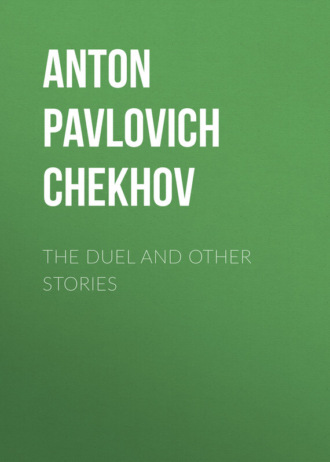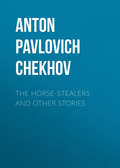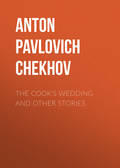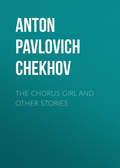
Антон Чехов
The Duel and Other Stories
On the right side of his neck was a small swelling, of the length and breadth of his little finger, and he felt a pain, as though some one had passed a hot iron over his neck. The bullet had bruised it.
Afterwards, when he got home, a strange, long, sweet day began for him, misty as forgetfulness. Like a man released from prison or from hospital, he stared at the long-familiar objects and wondered that the tables, the windows, the chairs, the light, and the sea stirred in him a keen, childish delight such as he had not known for long, long years. Nadyezhda Fyodorovna, pale and haggard, could not understand his gentle voice and strange movements; she made haste to tell him everything that had happened to her… It seemed to her that very likely he scarcely heard and did not understand her, and that if he did know everything he would curse her and kill her, but he listened to her, stroked her face and hair, looked into her eyes and said:
"I have nobody but you.."
Then they sat a long while in the garden, huddled close together, saying nothing, or dreaming aloud of their happy life in the future, in brief, broken sentences, while it seemed to him that he had never spoken at such length or so eloquently.
XXI
More than three months had passed.
The day came that Von Koren had fixed on for his departure. A cold, heavy rain had been falling from early morning, a north-east wind was blowing, and the waves were high on the sea. It was said that the steamer would hardly be able to come into the harbour in such weather. By the time-table it should have arrived at ten o'clock in the morning, but Von Koren, who had gone on to the sea-front at midday and again after dinner, could see nothing through the field-glass but grey waves and rain covering the horizon.
Towards the end of the day the rain ceased and the wind began to drop perceptibly. Von Koren had already made up his mind that he would not be able to get off that day, and had settled down to play chess with Samoylenko; but after dark the orderly announced that there were lights on the sea and that a rocket had been seen.
Von Koren made haste. He put his satchel over his shoulder, and kissed Samoylenko and the deacon. Though there was not the slightest necessity, he went through the rooms again, said good-bye to the orderly and the cook, and went out into the street, feeling that he had left something behind, either at the doctor's or his lodging. In the street he walked beside Samoylenko, behind them came the deacon with a box, and last of all the orderly with two portmanteaus. Only Samoylenko and the orderly could distinguish the dim lights on the sea. The others gazed into the darkness and saw nothing. The steamer had stopped a long way from the coast.
"Make haste, make haste," Von Koren hurried them. "I am afraid it will set off."
As they passed the little house with three windows, into which Laevsky had moved soon after the duel, Von Koren could not resist peeping in at the window. Laevsky was sitting, writing, bent over the table, with his back to the window.
"I wonder at him!" said the zoologist softly. "What a screw he has put on himself!"
"Yes, one may well wonder," said Samoylenko. "He sits from morning till night, he's always at work. He works to pay off his debts. And he lives, brother, worse than a beggar!"
Half a minute of silence followed. The zoologist, the doctor, and the deacon stood at the window and went on looking at Laevsky.
"So he didn't get away from here, poor fellow," said Samoylenko.
"Do you remember how hard he tried?"
"Yes, he has put a screw on himself," Von Koren repeated. "His marriage, the way he works all day long for his daily bread, a new expression in his face, and even in his walk – it's all so extraordinary that I don't know what to call it."
The zoologist took Samoylenko's sleeve and went on with emotion in his voice:
"You tell him and his wife that when I went away I was full of admiration for them and wished them all happiness.. and I beg him, if he can, not to remember evil against me. He knows me. He knows that if I could have foreseen this change, then I might have become his best friend."
"Go in and say good-bye to him."
"No, that wouldn't do."
"Why? God knows, perhaps you'll never see him again."
The zoologist reflected, and said:
"That's true."
Samoylenko tapped softly at the window. Laevsky started and looked round.
"Vanya, Nikolay Vassilitch wants to say goodbye to you," said
Samoylenko. "He is just going away."
Laevsky got up from the table, and went into the passage to open the door. Samoylenko, the zoologist, and the deacon went into the house.
"I can only come for one minute," began the zoologist, taking off his goloshes in the passage, and already wishing he had not given way to his feelings and come in, uninvited. "It is as though I were forcing myself on him," he thought, "and that's stupid."
"Forgive me for disturbing you," he said as he went into the room with Laevsky, "but I'm just going away, and I had an impulse to see you. God knows whether we shall ever meet again."
"I am very glad to see you… Please come in," said Laevsky, and he awkwardly set chairs for his visitors as though he wanted to bar their way, and stood in the middle of the room, rubbing his hands.
"I should have done better to have left my audience in the street," thought Von Koren, and he said firmly: "Don't remember evil against me, Ivan Andreitch. To forget the past is, of course, impossible – it is too painful, and I've not come here to apologise or to declare that I was not to blame. I acted sincerely, and I have not changed my convictions since then… It is true that I see, to my great delight, that I was mistaken in regard to you, but it's easy to make a false step even on a smooth road, and, in fact, it's the natural human lot: if one is not mistaken in the main, one is mistaken in the details. Nobody knows the real truth."
"No, no one knows the truth," said Laevsky.
"Well, good-bye… God give you all happiness."
Von Koren gave Laevsky his hand; the latter took it and bowed.
"Don't remember evil against me," said Von Koren. "Give my greetings to your wife, and say I am very sorry not to say good-bye to her."
"She is at home."
Laevsky went to the door of the next room, and said:
"Nadya, Nikolay Vassilitch wants to say goodbye to you."
Nadyezhda Fyodorovna came in; she stopped near the doorway and looked shyly at the visitors. There was a look of guilt and dismay on her face, and she held her hands like a schoolgirl receiving a scolding.
"I'm just going away, Nadyezhda Fyodorovna," said Von Koren, "and have come to say good-bye."
She held out her hand uncertainly, while Laevsky bowed.
"What pitiful figures they are, though!" thought Von Koren. "The life they are living does not come easy to them. I shall be in Moscow and Petersburg; can I send you anything?" he asked.
"Oh!" said Nadyezhda Fyodorovna, and she looked anxiously at her husband. "I don't think there's anything.."
"No, nothing." said Laevsky, rubbing his hands. "Our greetings."
Von Koren did not know what he could or ought to say, though as he went in he thought he would say a very great deal that would be warm and good and important. He shook hands with Laevsky and his wife in silence, and left them with a depressed feeling.
"What people!" said the deacon in a low voice, as he walked behind them. "My God, what people! Of a truth, the right hand of God has planted this vine! Lord! Lord! One man vanquishes thousands and another tens of thousands. Nikolay Vassilitch," he said ecstatically, "let me tell you that to-day you have conquered the greatest of man's enemies – pride."
"Hush, deacon! Fine conquerors we are! Conquerors ought to look like eagles, while he's a pitiful figure, timid, crushed; he bows like a Chinese idol, and I, I am sad.."
They heard steps behind them. It was Laevsky, hurrying after them to see him off. The orderly was standing on the quay with the two portmanteaus, and at a little distance stood four boatmen.
"There is a wind, though… Brrr!" said Samoylenko. "There must be a pretty stiff storm on the sea now! You are not going off at a nice time, Koyla."
"I'm not afraid of sea-sickness."
"That's not the point… I only hope these rascals won't upset you. You ought to have crossed in the agent's sloop. Where's the agent's sloop?" he shouted to the boatmen.
"It has gone, Your Excellency."
"And the Customs-house boat?"
"That's gone, too."
"Why didn't you let us know," said Samoylenko angrily. "You dolts!"
"It's all the same, don't worry yourself." said Von Koren.
"Well, good-bye. God keep you."
Samoylenko embraced Von Koren and made the sign of the cross over him three times.
"Don't forget us, Kolya… Write… We shall look out for you next spring."
"Good-bye, deacon," said Von Koren, shaking hands with the deacon.
"Thank you for your company and for your pleasant conversation.
Think about the expedition."
"Oh Lord, yes! to the ends of the earth," laughed the deacon. "I've nothing against it."
Von Koren recognised Laevsky in the darkness, and held out his hand without speaking. The boatmen were by now below, holding the boat, which was beating against the piles, though the breakwater screened it from the breakers. Von Koren went down the ladder, jumped into the boat, and sat at the helm.
"Write!" Samoylenko shouted to him. "Take care of yourself."
"No one knows the real truth," thought Laevsky, turning up the collar of his coat and thrusting his hands into his sleeves.
The boat turned briskly out of the harbour into the open sea. It vanished in the waves, but at once from a deep hollow glided up onto a high breaker, so that they could distinguish the men and even the oars. The boat moved three yards forward and was sucked two yards back.
"Write!" shouted Samoylenko; "it's devilish weather for you to go in."
"Yes, no one knows the real truth." thought Laevsky, looking wearily at the dark, restless sea.
"It flings the boat back," he thought; "she makes two steps forward and one step back; but the boatmen are stubborn, they work the oars unceasingly, and are not afraid of the high waves. The boat goes on and on. Now she is out of sight, but in half an hour the boatmen will see the steamer lights distinctly, and within an hour they will be by the steamer ladder. So it is in life… In the search for truth man makes two steps forward and one step back. Suffering, mistakes, and weariness of life thrust them back, but the thirst for truth and stubborn will drive them on and on. And who knows? Perhaps they will reach the real truth at last."
"Go – o – od-by – e," shouted Samoylenko.
"There's no sight or sound of them," said the deacon. "Good luck on the journey!"
It began to spot with rain.
EXCELLENT PEOPLE
ONCE upon a time there lived in Moscow a man called Vladimir Semyonitch Liadovsky. He took his degree at the university in the faculty of law and had a post on the board of management of some railway; but if you had asked him what his work was, he would look candidly and openly at you with his large bright eyes through his gold pincenez, and would answer in a soft, velvety, lisping baritone:
"My work is literature."
After completing his course at the university, Vladimir Semyonitch had had a paragraph of theatrical criticism accepted by a newspaper. From this paragraph he passed on to reviewing, and a year later he had advanced to writing a weekly article on literary matters for the same paper. But it does not follow from these facts that he was an amateur, that his literary work was of an ephemeral, haphazard character. Whenever I saw his neat spare figure, his high forehead and long mane of hair, when I listened to his speeches, it always seemed to me that his writing, quite apart from what and how he wrote, was something organically part of him, like the beating of his heart, and that his whole literary programme must have been an integral part of his brain while he was a baby in his mother's womb. Even in his walk, his gestures, his manner of shaking off the ash from his cigarette, I could read this whole programme from A to Z, with all its claptrap, dulness, and honourable sentiments. He was a literary man all over when with an inspired face he laid a wreath on the coffin of some celebrity, or with a grave and solemn face collected signatures for some address; his passion for making the acquaintance of distinguished literary men, his faculty for finding talent even where it was absent, his perpetual enthusiasm, his pulse that went at one hundred and twenty a minute, his ignorance of life, the genuinely feminine flutter with which he threw himself into concerts and literary evenings for the benefit of destitute students, the way in which he gravitated towards the young – all this would have created for him the reputation of a writer even if he had not written his articles.
He was one of those writers to whom phrases like, "We are but few," or "What would life be without strife? Forward!" were pre-eminently becoming, though he never strove with any one and never did go forward. It did not even sound mawkish when he fell to discoursing of ideals. Every anniversary of the university, on St. Tatiana's Day, he got drunk, chanted Gaudeamus out of tune, and his beaming and perspiring countenance seemed to say: "See, I'm drunk; I'm keeping it up!" But even that suited him.
Vladimir Semyonitch had genuine faith in his literary vocation and his whole programme. He had no doubts, and was evidently very well pleased with himself. Only one thing grieved him – the paper for which he worked had a limited circulation and was not very influential. But Vladimir Semyonitch believed that sooner or later he would succeed in getting on to a solid magazine where he would have scope and could display himself – and what little distress he felt on this score was pale beside the brilliance of his hopes.
Visiting this charming man, I made the acquaintance of his sister, Vera Semyonovna, a woman doctor. At first sight, what struck me about this woman was her look of exhaustion and extreme ill-health. She was young, with a good figure and regular, rather large features, but in comparison with her agile, elegant, and talkative brother she seemed angular, listless, slovenly, and sullen. There was something strained, cold, apathetic in her movements, smiles, and words; she was not liked, and was thought proud and not very intelligent.
In reality, I fancy, she was resting.
"My dear friend," her brother would often say to me, sighing and flinging back his hair in his picturesque literary way, "one must never judge by appearances! Look at this book: it has long ago been read. It is warped, tattered, and lies in the dust uncared for; but open it, and it will make you weep and turn pale. My sister is like that book. Lift the cover and peep into her soul, and you will be horror-stricken. Vera passed in some three months through experiences that would have been ample for a whole lifetime!"
Vladimir Semyonitch looked round him, took me by the sleeve, and began to whisper:
"You know, after taking her degree she married, for love, an architect. It's a complete tragedy! They had hardly been married a month when – whew – her husband died of typhus. But that was not all. She caught typhus from him, and when, on her recovery, she learnt that her Ivan was dead, she took a good dose of morphia. If it had not been for vigorous measures taken by her friends, my Vera would have been by now in Paradise. Tell me, isn't it a tragedy? And is not my sister like an ingénue, who has played already all the five acts of her life? The audience may stay for the farce, but the ingénue must go home to rest."
After three months of misery Vera Semyonovna had come to live with her brother. She was not fitted for the practice of medicine, which exhausted her and did not satisfy her; she did not give one the impression of knowing her subject, and I never once heard her say anything referring to her medical studies.
She gave up medicine, and, silent and unoccupied, as though she were a prisoner, spent the remainder of her youth in colourless apathy, with bowed head and hanging hands. The only thing to which she was not completely indifferent, and which brought some brightness into the twilight of her life, was the presence of her brother, whom she loved. She loved him himself and his programme, she was full of reverence for his articles; and when she was asked what her brother was doing, she would answer in a subdued voice as though afraid of waking or distracting him: "He is writing.." Usually when he was at his work she used to sit beside him, her eyes fixed on his writing hand. She used at such moments to look like a sick animal warming itself in the sun..
One winter evening Vladimir Semyonitch was sitting at his table writing a critical article for his newspaper: Vera Semyonovna was sitting beside him, staring as usual at his writing hand. The critic wrote rapidly, without erasures or corrections. The pen scratched and squeaked. On the table near the writing hand there lay open a freshly-cut volume of a thick magazine, containing a story of peasant life, signed with two initials. Vladimir Semyonitch was enthusiastic; he thought the author was admirable in his handling of the subject, suggested Turgenev in his descriptions of nature, was truthful, and had an excellent knowledge of the life of the peasantry. The critic himself knew nothing of peasant life except from books and hearsay, but his feelings and his inner convictions forced him to believe the story. He foretold a brilliant future for the author, assured him he should await the conclusion of the story with great impatience, and so on.
"Fine story!" he said, flinging himself back in his chair and closing his eyes with pleasure. "The tone is extremely good."
Vera Semyonovna looked at him, yawned aloud, and suddenly asked an unexpected question. In the evening she had a habit of yawning nervously and asking short, abrupt questions, not always relevant.
"Volodya," she asked, "what is the meaning of non-resistance to evil?"
"Non-resistance to evil!" repeated her brother, opening his eyes.
"Yes. What do you understand by it?"
"You see, my dear, imagine that thieves or brigands attack you, and you, instead of."
"No, give me a logical definition."
"A logical definition? Um! Well." Vladimir Semyonitch pondered. "Non-resistance to evil means an attitude of non-interference with regard to all that in the sphere of mortality is called evil."
Saying this, Vladimir Semyonitch bent over the table and took up a novel. This novel, written by a woman, dealt with the painfulness of the irregular position of a society lady who was living under the same roof with her lover and her illegitimate child. Vladimir Semyonitch was pleased with the excellent tendency of the story, the plot and the presentation of it. Making a brief summary of the novel, he selected the best passages and added to them in his account: "How true to reality, how living, how picturesque! The author is not merely an artist; he is also a subtle psychologist who can see into the hearts of his characters. Take, for example, this vivid description of the emotions of the heroine on meeting her husband," and so on.
"Volodya," Vera Semyonovna interrupted his critical effusions, "I've been haunted by a strange idea since yesterday. I keep wondering where we should all be if human life were ordered on the basis of non-resistance to evil?"
"In all probability, nowhere. Non-resistance to evil would give the full rein to the criminal will, and, to say nothing of civilisation, this would leave not one stone standing upon another anywhere on earth."
"What would be left?"
"Bashi-Bazouke and brothels. In my next article I'll talk about that perhaps. Thank you for reminding me."
And a week later my friend kept his promise. That was just at the period – in the eighties – when people were beginning to talk and write of non-resistance, of the right to judge, to punish, to make war; when some people in our set were beginning to do without servants, to retire into the country, to work on the land, and to renounce animal food and carnal love.
After reading her brother's article, Vera Semyonovna pondered and hardly perceptibly shrugged her shoulders.
"Very nice!" she said. "But still there's a great deal I don't understand. For instance, in Leskov's story 'Belonging to the Cathedral' there is a queer gardener who sows for the benefit of all – for customers, for beggars, and any who care to steal. Did he behave sensibly?"
From his sister's tone and expression Vladimir Semyonitch saw that she did not like his article, and, almost for the first time in his life, his vanity as an author sustained a shock. With a shade of irritation he answered:
"Theft is immoral. To sow for thieves is to recognise the right of thieves to existence. What would you think if I were to establish a newspaper and, dividing it into sections, provide for blackmailing as well as for liberal ideas? Following the example of that gardener, I ought, logically, to provide a section for blackmailers, the intellectual scoundrels? Yes."
Vera Semyonovna made no answer. She got up from the table, moved languidly to the sofa and lay down.
"I don't know, I know nothing about it," she said musingly. "You are probably right, but it seems to me, I feel somehow, that there's something false in our resistance to evil, as though there were something concealed or unsaid. God knows, perhaps our methods of resisting evil belong to the category of prejudices which have become so deeply rooted in us, that we are incapable of parting with them, and therefore cannot form a correct judgment of them."
"How do you mean?"
"I don't know how to explain to you. Perhaps man is mistaken in thinking that he is obliged to resist evil and has a right to do so, just as he is mistaken in thinking, for instance, that the heart looks like an ace of hearts. It is very possible in resisting evil we ought not to use force, but to use what is the very opposite of force – if you, for instance, don't want this picture stolen from you, you ought to give it away rather than lock it up.."
"That's clever, very clever! If I want to marry a rich, vulgar woman, she ought to prevent me from such a shabby action by hastening to make me an offer herself!"
The brother and sister talked till midnight without understanding each other. If any outsider had overheard them he would hardly have been able to make out what either of them was driving at.
They usually spent the evening at home. There were no friends' houses to which they could go, and they felt no need for friends; they only went to the theatre when there was a new play – such was the custom in literary circles – they did not go to concerts, for they did not care for music.
"You may think what you like," Vera Semyonovna began again the next day, "but for me the question is to a great extent settled. I am firmly convinced that I have no grounds for resisting evil directed against me personally. If they want to kill me, let them. My defending myself will not make the murderer better. All I have now to decide is the second half of the question: how I ought to behave to evil directed against my neighbours?"
"Vera, mind you don't become rabid!" said Vladimir Semyonitch, laughing. "I see non-resistance is becoming your idée fixe!"
He wanted to turn off these tedious conversations with a jest, but somehow it was beyond a jest; his smile was artificial and sour. His sister gave up sitting beside his table and gazing reverently at his writing hand, and he felt every evening that behind him on the sofa lay a person who did not agree with him. And his back grew stiff and numb, and there was a chill in his soul. An author's vanity is vindictive, implacable, incapable of forgiveness, and his sister was the first and only person who had laid bare and disturbed that uneasy feeling, which is like a big box of crockery, easy to unpack but impossible to pack up again as it was before.
Weeks and months passed by, and his sister clung to her ideas, and did not sit down by the table. One spring evening Vladimir Semyonitch was sitting at his table writing an article. He was reviewing a novel which described how a village schoolmistress refused the man whom she loved and who loved her, a man both wealthy and intellectual, simply because marriage made her work as a schoolmistress impossible. Vera Semyonovna lay on the sofa and brooded.
"My God, how slow it is!" she said, stretching. "How insipid and empty life is! I don't know what to do with myself, and you are wasting your best years in goodness knows what. Like some alchemist, you are rummaging in old rubbish that nobody wants. My God!"
Vladimir Semyonitch dropped his pen and slowly looked round at his sister.
"It's depressing to look at you!" said his sister. "Wagner in 'Faust' dug up worms, but he was looking for a treasure, anyway, and you are looking for worms for the sake of the worms."
"That's vague!"
"Yes, Volodya; all these days I've been thinking, I've been thinking painfully for a long time, and I have come to the conclusion that you are hopelessly reactionary and conventional. Come, ask yourself what is the object of your zealous, conscientious work? Tell me, what is it? Why, everything has long ago been extracted that can be extracted from that rubbish in which you are always rummaging. You may pound water in a mortar and analyse it as long as you like, you'll make nothing more of it than the chemists have made already.."
"Indeed!" drawled Vladimir Semyonitch, getting up. "Yes, all this is old rubbish because these ideas are eternal; but what do you consider new, then?"
"You undertake to work in the domain of thought; it is for you to think of something new. It's not for me to teach you."
"Me – an alchemist!" the critic cried in wonder and indignation, screwing up his eyes ironically. "Art, progress – all that is alchemy?"
"You see, Volodya, it seems to me that if all you thinking people had set yourselves to solving great problems, all these little questions that you fuss about now would solve themselves by the way. If you go up in a balloon to see a town, you will incidentally, without any effort, see the fields and the villages and the rivers as well. When stearine is manufactured, you get glycerine as a by-product. It seems to me that contemporary thought has settled on one spot and stuck to it. It is prejudiced, apathetic, timid, afraid to take a wide titanic flight, just as you and I are afraid to climb on a high mountain; it is conservative."
Such conversations could not but leave traces. The relations of the brother and sister grew more and more strained every day. The brother became unable to work in his sister's presence, and grew irritable when he knew his sister was lying on the sofa, looking at his back; while the sister frowned nervously and stretched when, trying to bring back the past, he attempted to share his enthusiasms with her. Every evening she complained of being bored, and talked about independence of mind and those who are in the rut of tradition. Carried away by her new ideas, Vera Semyonovna proved that the work that her brother was so engrossed in was conventional, that it was a vain effort of conservative minds to preserve what had already served its turn and was vanishing from the scene of action. She made no end of comparisons. She compared her brother at one time to an alchemist, then to a musty old Believer who would sooner die than listen to reason. By degrees there was a perceptible change in her manner of life, too. She was capable of lying on the sofa all day long doing nothing but think, while her face wore a cold, dry expression such as one sees in one-sided people of strong faith. She began to refuse the attentions of the servants, swept and tidied her own room, cleaned her own boots and brushed her own clothes. Her brother could not help looking with irritation and even hatred at her cold face when she went about her menial work. In that work, which was always performed with a certain solemnity, he saw something strained and false, he saw something both pharisaical and affected. And knowing he could not touch her by persuasion, he carped at her and teased her like a schoolboy.
"You won't resist evil, but you resist my having servants!" he taunted her. "If servants are an evil, why do you oppose it? That's inconsistent!"
He suffered, was indignant and even ashamed. He felt ashamed when his sister began doing odd things before strangers.
"It's awful, my dear fellow," he said to me in private, waving his hands in despair. "It seems that our ingénue has remained to play a part in the farce, too. She's become morbid to the marrow of her bones! I've washed my hands of her, let her think as she likes; but why does she talk, why does she excite me? She ought to think what it means for me to listen to her. What I feel when in my presence she has the effrontery to support her errors by blasphemously quoting the teaching of Christ! It chokes me! It makes me hot all over to hear my sister propounding her doctrines and trying to distort the Gospel to suit her, when she purposely refrains from mentioning how the moneychangers were driven out of the Temple. That's, my dear fellow, what comes of being half educated, undeveloped! That's what comes of medical studies which provide no general culture!"
One day on coming home from the office, Vladimir Semyonitch found his sister crying. She was sitting on the sofa with her head bowed, wringing her hands, and tears were flowing freely down her cheeks. The critic's good heart throbbed with pain. Tears fell from his eyes, too, and he longed to pet his sister, to forgive her, to beg her forgiveness, and to live as they used to before… He knelt down and kissed her head, her hands, her shoulders… She smiled, smiled bitterly, unaccountably, while he with a cry of joy jumped up, seized the magazine from the table and said warmly:







